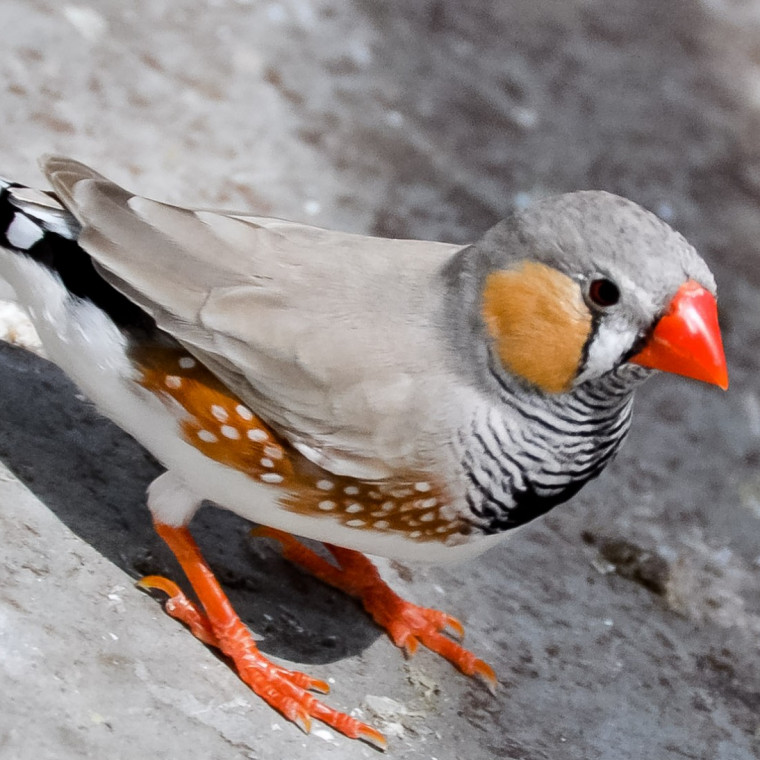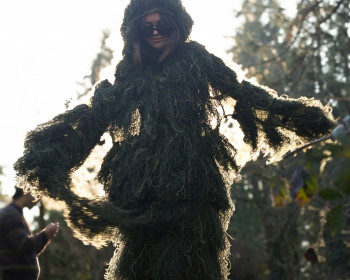Songbirds help student study effects of binge drinking
Open gallery

During the summer, Lewis & Clark students continue to work hard in their fields of study. By collaborating with faculty on research projects, students are able to engage their curiosity, expand their learning, and prepare for life after college, all while making meaningful contributions to scholarship.
Devin Owen ’14 has the unique experience of working in a laboratory with Christopher Olson, a postdoctoral fellow at Oregon Health & Science University (OHSU). The two are investigating the ways in which binge drinking in young adults can contribute to problems with cognitive development. They are also pioneering the use of songbirds in human behavioral research. In the following Q&A, Owen reflects on his experience.
What are you researching? What question or problem are you trying to answer/solve with your research?
My research began with the observation that excessive drinking causes a number of developmental and physiological problems. For instance, teenagers and youth who start binge drinking at early ages show problems with verbal learning and recall, and even have decreased brain volumes. I use zebra finches, a type of songbird, to study these phenomena. Songbirds possess a series of brain circuits used for song learning and production that are analogous to human motor pathways.
My research focuses on developing a system to study the genetic underpinnings to the abnormal behaviors we see in binge drinking juvenile birds. I will also continue conducting pilot studies to further advance our knowledge of the interaction between birds and alcohol, in order to strengthen our current use of songbirds as model organisms for human behavior.
Does your research have any potential applications in the real world, or will it influence other work in your field?
Part of my research involves developing the songbird as a good model organism for human research. Alcohol and other substance research has not been done with songbirds before, so the first step is to make sure that the model we use is an accurate reflection of human behavioral characteristics and physiology. Ultimately, the goal is to show that what we learn when studying songbirds can be translated into a deeper understanding of humans. Though a practical use is a ways off, if we can effectively model human behavior and cognitive function with songbirds, it will open up possibilities for eventually developing better treatments and interventions for people with alcohol use disorders.
Is any of your research taking place off campus? If so, what’s that experience like?
My research takes place at OHSU in the behavioral neuroscience department. Working at OHSU is an entirely different atmosphere. I get the feeling of being in a real workplace rather than another classroom, and that motivates me to keep working hard. Working in my lab at OHSU has inspired me to pursue research once I graduate from Lewis & Clark.
What first sparked your interest in this research area?
I came into the lab with an academic interest in neuroscience and a casual interest in birds. I had recently taken Drugs and Behavior, a class in the psychology department, and thought that this research was a good continuation of what I had learned there. I have since become fascinated by alcohol and substance research topics, and the development of the songbird as a model organism leaves open many possibilities for future work and projects of which I hope to be a part.
How has working closely with faculty influenced your education?
My closest mentor, Chris Olson, comes from a background in biology. Coming from psychology myself, I think he was a bit wary about my knowledge set. You should have seen his shock when I told him I didn’t even know how to pipette! Since working with him, I have found a new interest in the biology side of neuroscience. I am now in a position where I can stay in the psychology based behavior side of the field, or make a transition to the biology based neurological and genetic side of the field. Thanks to working with Chris, the possibilities for my future have greatly expanded.
How do you hope your experiences this summer will impact your future studies or professional pursuits?
Part of my responsibilities this summer will be to mentor a high school student from the Portland area. I hope to work on my teaching and mentoring skills, as this experience has shown me that I want to continue with a career in education as well as research. I will no doubt continue my education in neuroscience, all the while seeking out opportunities to interact and work with youth and college students.
Anything else you’d care to add?
The experiences that this program has given me have been invaluable in helping determine what I want to do after college as well as developing my skills as a researcher and mentor. I wish that more similar programs existed so that more students could discover what science is on a practical level, and fall in love with the work just as I have. I am now a passionate advocate for my field of research, and hope to make a significant contribution to the field by continuing to build the songbird model and discovering new ways that alcohol affects the brain.
About the program
The John S. Rogers Science Research Program allows students to participate in graduate-level research with an emphasis on strengthening their communication skills by requiring them to present their findings. This summer, 40 students are pursuing topics that range from artificial intelligence and motivating behavior to holographic tweezers and zebra fish. Working closely with peers and faculty members, students undertake research questions and present their work in two public venues.
“We’re not asking you, ‘What’s the answer?’ We’re saying, ‘What’s the question?’” said Michael Broide, director of the Rogers program and chair of the physics department. “I think what sets our program apart is that regardless of what project you are on, we’re all going to come together as a group to present what we’re doing in as accessible a way as possible. In science, it’s such an important skill to be able to explain cogently what you’re doing.”
Students make their final research presentation at the Rogers summer science poster session, held in conjunction with the Science Without Limits Symposium. Scheduled for September 18, the poster session is free and open to the public.
Neuroscience Minor Rogers Summer Research Projects
Zibby Pillote ’14 contributed to this story.
More Newsroom Stories
Public Relations is located in McAfee on the Undergraduate Campus.
MSC: 19
email public@lclark.edu
voice 503-768-7970
Public Relations
Lewis & Clark
615 S. Palatine Hill Road MSC 19
Portland OR 97219

